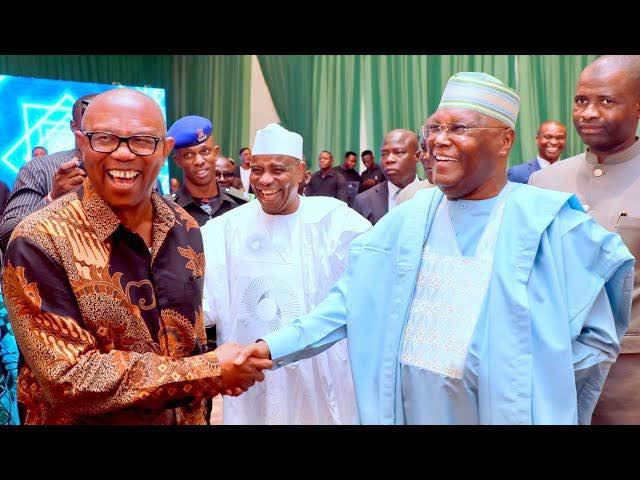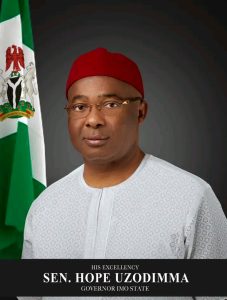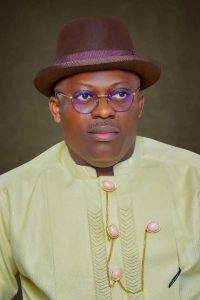Why No Coalition Can Unseat APC in 2027: A Cold, Data-Driven Truth
In the ever-shifting terrain of Nigerian politics, one idea that keeps resurfacing is the notion of a “grand opposition coalition.” It’s a narrative that re-emerges with every election cycle, propped up by public frustration, media speculation, and opposition desperation. The thinking goes: if the major parties outside power can only set aside their differences and unite behind a common cause, then surely the ruling All Progressives Congress (APC) can be unseated. But beneath this hopeful theory lies a much colder political reality, one that Charles Awuzie recently laid bare in a no-nonsense analysis. According to him, no coalition—no matter how broad or loud—can remove APC from power. The only thing that can destabilize APC is APC itself.
Awuzie, the founder of Gemsbok Group, which specializes in Political Data Intelligence, isn’t simply being provocative. He is reading the political map with the discipline of someone who understands how systems collapse—not from pressure outside, but from fragmentation within. It is this core thesis that makes his argument deeply unsettling to many opposition supporters. His prediction isn’t based on idealism or nostalgia for 2015. It’s an unflinching look at the current political structure, and why the opposition’s obsession with replicating the APC merger of the past is now a political dead end.
The 2015 coalition that brought APC to power was a historical anomaly. It brought together multiple parties, unified by their shared resentment of the then-dominant PDP and the charisma of Muhammadu Buhari. That merger had energy, structure, and timing on its side. The public wanted change, and the opposition was able to provide it under one banner. But that strategy cannot be copy-pasted into 2027. The APC is no longer the challenger; it is the establishment. The party now controls the machinery of state—access to power, media influence, security infrastructure, and deep patronage networks. It is, in many ways, a replica of the PDP of old, and it will take more than a handshake between opposition leaders to move it.
YOU MAY READ
BREAKING: Peter Obi Withdraws From All Political Coalitions Ahead of 2027 Elections
Even if opposition parties came together, the fundamental question remains: who leads? The dilemma is not merely about electoral arithmetic. It’s about ego, hierarchy, and ambition. Atiku Abubakar, who has contested the presidency more than any other figure in the Fourth Republic, is unlikely to play second fiddle. He sees himself as the elder statesman of opposition politics, a financier and political heavyweight. Meanwhile, Rotimi Amaechi, once a formidable player within APC, has presidential ambitions of his own. Any coalition involving him would require guarantees of influence—not subservience. Then there’s Peter Obi, whose support base—the Obidient movement—is radically different from the traditional political blocs. That movement sees Obi not just as a candidate, but as a symbol of generational and moral renewal. If Obi accepts a subordinate position in a coalition headed by Atiku or Amaechi, his support base could collapse overnight.
This brings us to one of Awuzie’s most insightful—and controversial—observations. He predicts that the Obidient movement will dissipate the moment Peter Obi accepts a vice-presidential slot in any alliance. To many, this may sound extreme. But the movement is unique in Nigerian political history. It is youth-driven, urban, socially networked, and animated by the belief that Obi offers a real alternative to the political class. That belief is not transferable. The Obidients are not loyal to the Labour Party. They are not beholden to the Southeast political elite. They are loyal to a vision that Obi represents—one of efficiency, decency, and national rebirth. Any alliance that dilutes that vision with recycled political figures from the past would be seen as betrayal. The support that made Labour competitive in 2023 would shrink—perhaps by as much as 40 percent.
The result of any coalition involving Obi, Atiku, and Amaechi would be chaos. Not ideological alignment. Not a common front. Just competing interests wrapped in the same campaign fabric. Awuzie captures this dysfunction in a metaphor that cuts deeper than it seems at first: the chances of such a coalition succeeding are slimmer than the urethra. It is too small to excrete solid waste—yet it still releases fluid. The coalition, in this view, would lack substance. There would be movement, yes, but no mass. No cohesion. Nothing solid enough to challenge the APC structure.
And what about the APC itself? While its external profile may look strong, Awuzie warns of internal decay. The party is not growing—it is swelling. Growth implies structure, health, and capacity. Swelling implies bloating, infection, and eventual rupture. The APC continues to absorb defectors, many of them from the PDP, without clear ideological or strategic purpose. These new arrivals do not come with loyalty; they come with personal agendas. They add to the party’s bulk but subtract from its stability. At some point, this swelling becomes unsustainable. Implosion becomes inevitable—not because of the opposition’s strength, but because of the ruling party’s own contradictions.
YOU MAY READ
Atiku Offers Peter Obi VP Slot, Pledges One-Term Presidency in 2027 Coalition Bid
This mirrors the very trajectory that destroyed the PDP in 2015. Back then, the party had grown so accustomed to power that it ignored internal dissent, tolerated mediocrity, and alienated reformers. The exit of key figures and factions created a vacuum that APC exploited. Today, the APC is walking the same tightrope. Its internal democracy is weakening. Party discipline is in decline. And its ideological cohesion—if it ever had one—is now barely traceable.
Still, it would be naive to assume that APC’s internal contradictions will automatically result in defeat. The party remains resourceful and deeply entrenched. It has power brokers in every region, access to federal levers, and a narrative of continuity that resonates with many. Its challenge will come only when its internal factions decide that their grievances are more important than the party’s survival. That scenario is not inevitable—but it is plausible.
Opposition parties, for their part, have done little to earn credibility. The PDP continues to suffer from leadership crises and a lack of generational renewal. Labour has yet to translate the Obidient movement into institutional strength. The NNPP remains regionally limited. Even among their collective efforts, there is no ideological unity—just electoral desperation. Without a binding vision, these parties are unlikely to inspire voters or dislodge incumbents. They are not offering an alternative government. They are offering a different version of the same.
And this is where data intelligence becomes not only relevant but indispensable. Awuzie’s company, Gemsbok Group, is positioning itself at the intersection of politics and information. In a country where campaign decisions are still made based on guesswork, tribal assumptions, and roadside polling, the emergence of Political Data Intelligence (PDI) is a game-changer. Parties that embrace it will not only be more strategic—they will be more connected to the real electorate. They will know where voter fatigue is highest, where support is soft, which demographics are drifting, and how to frame narratives for maximum resonance. Without that insight, all parties—including the APC—will be navigating blind.
Awuzie isn’t merely a commentator. He’s part of a new breed of political entrepreneurs who believe in using technology, research, and insight to reshape the political ecosystem. His call to action—“Tell your Oga to book a PDI presentation with my team”—is more than marketing. It’s a warning. The old ways are crumbling. Those who fail to evolve will be swept aside by those who do.
To remove the APC, opposition leaders must first remove their egos. They must sacrifice personal ambition for structural reform. They must agree on who leads, who follows, and what binds them together beyond ambition. They must build not just an alliance—but a platform. Not just a campaign—but a movement. And above all, they must win the trust of the Nigerian people, many of whom now see little difference between one political party and another.
Until that happens, the APC will remain dominant—not because it is invincible, but because its opponents remain incoherent. The coalition dream is just that—a dream. The reality is far more complex, and less forgiving.
If there is any hope for change in 2027, it will not come from recycled tactics. It will come from innovation, discipline, and the willingness to confront hard truths. Coalition politics, as it stands, offers none of these. And unless that changes, APC’s dominance will persist, not by force, but by default.
No other political coalition in Nigeria will be able to unseat the APC.
Opposition coalition worked for APC but won’t work against it. Read that again .Only an INTERNAL disintegration through infiltration can destroy APC.APC should be careful of those joining the party from the PDP – the party is not growing, it is swelling. Swelling leads to implosion.And for those hoping for a coalition that will unseat APC, stick with the facts.The Obidient movement will disappear the moment Peter Obi accepts a VP position.No Obidient wants Peter Obi as a Vice President, Minister or even acting president. Obidients will abandon Obi if he accepts a VP position in a coalition. The numbers we saw in 2023 will crash by at least 40%.In a coalition led by Atiku and Amaechi, I also question Obi’s chance to a presidential candidacy.Atiku can not deputise Obi. Amaechi has presidential ambitions too. The coalition’s chance of success is slimmer than the urethra – too small to excrete solid waste but not too small to eject fluid out of the system. There’s really nothing SOLID in such situation – everything remains fluid.
My name is Charles Awuzie and we at Gemsbok Group will focus on delivering Political Data Intelligence to political parties for 2027. Oya Tell your Oga to book a PDI presentation with my team in Nigeria.





